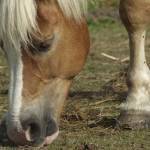Soil Ingestion in Horses: What’s Normal?

Have you ever watched a horse pull up a tuft of grass while grazing, complete with roots and clinging soil, and proceed to chew and swallow the entire mass? You might have thought, “Eww, dirt!” As grazing animals, horses consume their fair share of soil. Just how much soil they eat under normal grazing conditions is a question recently asked by European researchers.
Six mature Irish Sport Horses were placed in pairs and allocated to one of three grazing plots, consuming 2%, 3%, or 4% of their body weight in forage per day. The amount of grass offered to each pair was recalculated as they moved through the grazing plots. Each of the three grazing periods lasted 16 days, which included 10 days of adaptation to the new intake and 6 days of intake measurement. Soil ingestion was measured by the fecal recovery of acid insoluble ash, a natural soil marker.
How much soil did the horses eat? Researchers calculated horses consumed 1.42 lb (648 g), 1.37 lb (624 g), and 1.19 lb (543 g) of soil for 2%, 3%, and 4%, respectively, of pasture intake offered based on body weight. The post-grazing sward height was lowest when horses were allowed to graze 2% of their body weight when compared to other grazing allowances (3% and 4%, at 4.1 cm and 4.4 cm, respectively). Because of this, horses grazed closer to the ground, which increased soil intake.
Researchers concluded that amount of pasture and the height of pasture plants “appear to be useful tools to limit soil ingestion.” This information may prove applicable for horse owners that manage their own paddocks and pastures.
The primary health risk associated with soil ingestion is sand accumulation in the intestinal tract, which can lead to enteritis with diarrhea and colic. Ingestion of sand depends on specific geographic region and may not be a menace for all horses.
*Jurjanz, S., C. Collas, C. Quish, B. Younge, and C. Feidt. 2021. Ingestion of soil by grazing sport horses. Animals:1072109.








